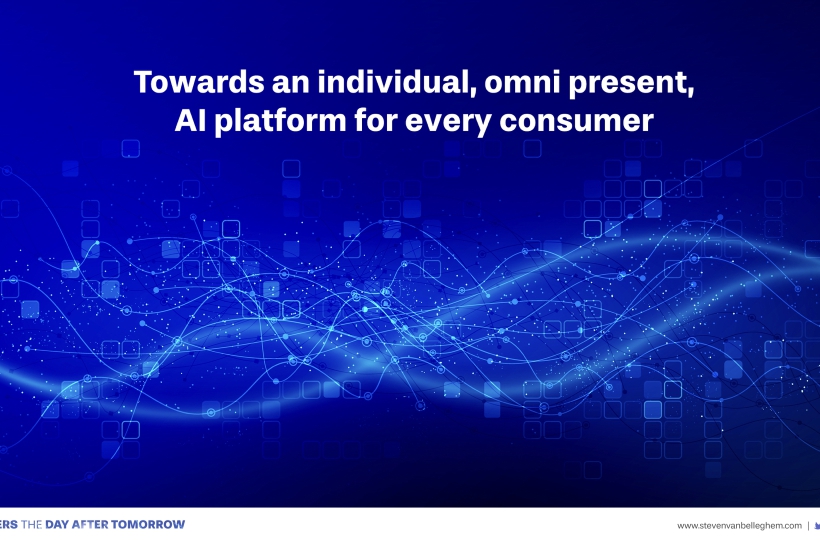How non-tech companies can stay relevant in the age of AI platforms – 3 recommendations

Support is the new convenience – become a life partner
I like to tell brands that their ‘selling days’ are coming to an end. That’s a good thing, because we will all finally move beyond the dry commercial exchanges into something that’s a lot more human, more emotional even. As you know, I’m often talking about how companies need to automate the day to day life of their customers in my presentations. I still believe that that’s true. But that’s ‘just’ about building convenience. The next step will bring us to an entirely different level: in a world ruled by omnipresent AI platforms, brands will need to become a partner, a coach even in the day to day life of their clients. They will become this extra support system layer in the lives of customers, and such a personalized omnipresent added value can only result in strong emotional bonds.
My advice for you is to think hard about what you can offer customers beyond “selling stuff”, and how you can assist them in achieving their goals. If you’re in financial services, for instance, find out how you can help your customers beyond managing their money efficiently, realizing their true hopes and dreams. This is the type of mindset that will help you to move up that brand ladder and make sure that you become a more preferred brand and keep visible in a world of AI assistant gatekeepers.
Only a platform can stand with (and against) platforms
Of course, if you want to keep your relevance in the AI ecosystem and philosophy, technology will play a big part in that. There’s no way around it. Yet the truth is, that for many non-tech companies, it will become increasingly impossible to handle the ultra-sophistication of AIOT (the blend of the intelligence of AI with the ‘senses’ of the IOT, as Jingwei Kang from Chinese IoT product development platform Ingdan calls it) systems on their own. They will need talent and money to manage these huge opportunities, and you know that’s a challenge if even the big companies out there are struggling with that.
Take BMW and Mercedes, for instance, two of the most successful and prestigious car brands in the world. They were able to manage perfectly, and very successfully on their own for more than 100 years. Yet today, these mighty competitors have joined forces to fight against the Ubers and Lyfts of this world. And it’s not about just working together, either. They actually started a new company together, both investing about a billion euros into it. I believe that this will become the new normal: companies, even competitors, actually working together, sharing investments, sharing talent, because there’s just too much scarcity in terms of resources (both money and people). You will only be able to only stand on the shoulders of the AI platforms if you partner up into a platform of your own.
But, on the other hand, I also believe that a lot of companies will figure out a way to work together with technology companies simply because they will need their resources. You can compare it with electricity: we will need their power to create certain benefits for our customers that we cannot achieve on our own. I believe that this type of ecosystems partnering thinking will be the future. The dynamics of company A competing against company B will be a thing of the past. We’ll end up with ecosystem A against ecosystem B. What you can start doing now already is figure out how you will add value to that ecosystem, how you can play your role in that ecosystem.
Appoint friction hunters
Last, but not least, if you want to stay relevant in the age of ultraconvenient platforms, you will need to get rid of all the friction. You will never be able to take up the role of an omnipresent and trusted “life partner” if interacting with you is hard, complex or even annoying. That’s why you’ll need a very special type of people in your organisation: I call them the friction hunters. You’ll appoint them to look for any type of friction in your current relationship with your customers.
I’m sure that, if you gather a group of five of your people, they will easily come up with 20 types of friction. And if you create a culture that is ‘obsessed’ with solving those, then you will end up presenting what I like to call “an offer you cannot refuse” to your customers. It will just become too easy to work with you, to interact with you, to buy from you. If you appoint friction hunters and create a culture that improves the customer relationship continuously, figuring out a way how you to build that ‘offer you cannot refuse’ becomes very pragmatic and reachable
I think that the combination of these 3 – partnering with customers for their day to day life, partnering up with other (tech) companies and working towards a culture of removing friction – will help every company to add more value in that relationship with customers. And it’s exactly what you need to play a vital role in a world of AI platforms.